Short plate ribs or “Dino” beef ribs come from the short plate primal.
The short plate is found in the forequarter of the cow – behind the brisket and below the rib primal.
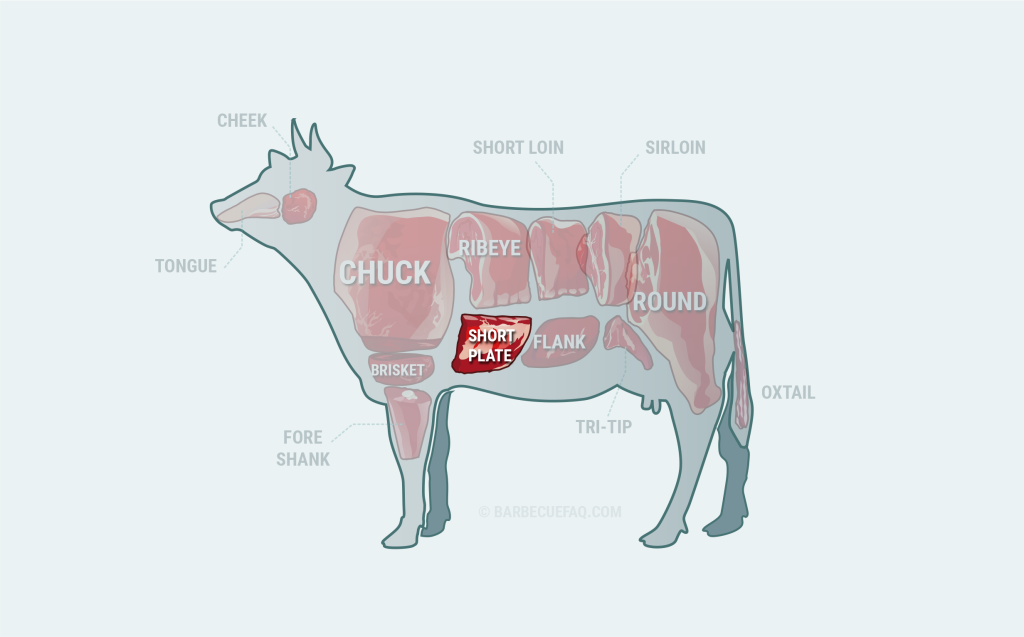
Specifically, short plate ribs are ribs number 6, 7, and 8.
Bones in this section of the animal are long (8-12 inches) and are wide and oval shaped.
What Muscle are Butchers Targeting with Dino Beef Plate Ribs?
They’re trying to isolate a singular muscle – the serratus ventralis.
Based on shear force values, this muscle is considered “very tender.”
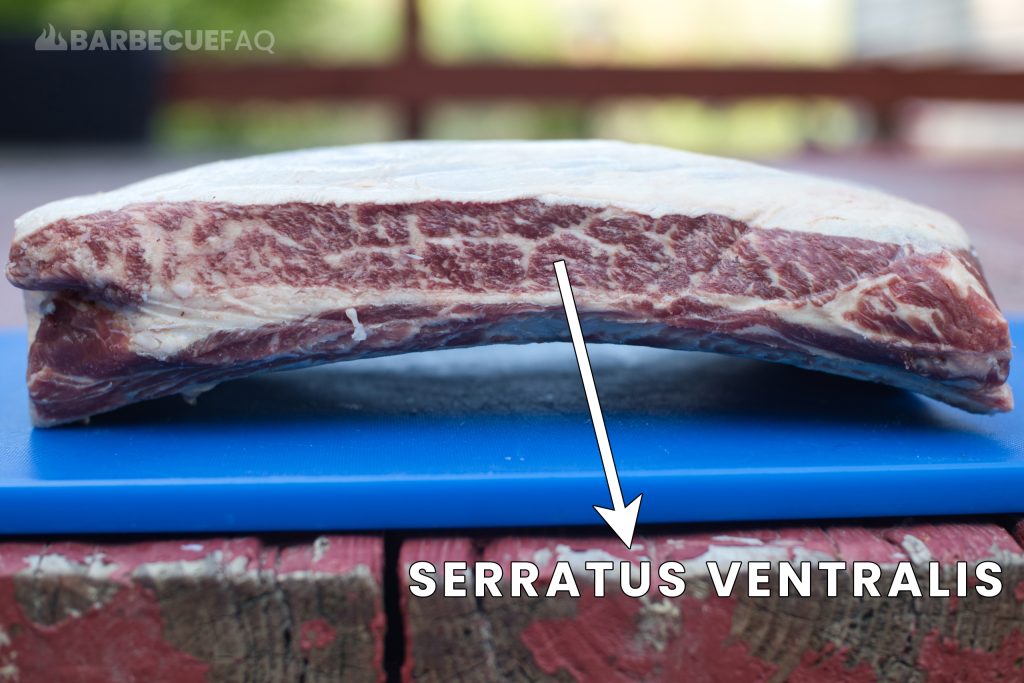
The reason ribs – like 9, 10, 11, or 12 – aren’t used for dino ribs is because this muscle begins to fade out in rib 9.
Beyond rib 8 there is very little lean meat and mostly fat, and people don’t like buying fat.
The beef chuck is also separated from the beef rib primal at rib bones 5 and 6.
Are “Dino” Beef Ribs the same as Chuck Short Ribs?
No.
As we’ve learned above, this rack of ribs is targeting a very specific part of the serratus ventralis muscle.
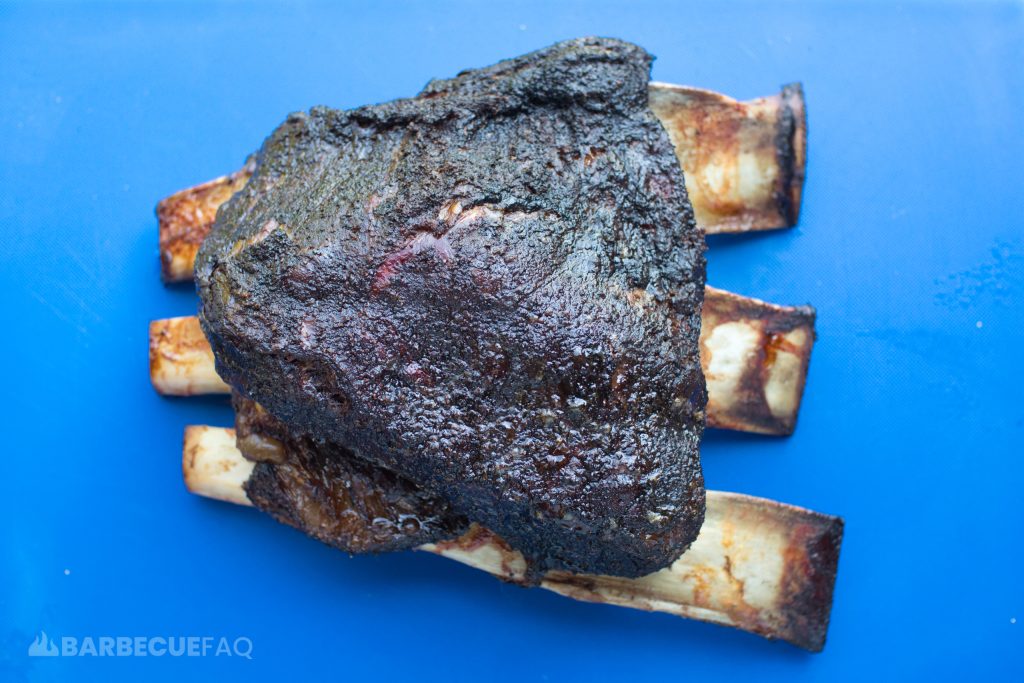
Chuck short ribs are sold as 4 bone slabs.
The bones in this section are more rounded/oval and the lean meat is usually less tender.
To cite shear force values from Reuter, B & Wulf, D & Shanks, B & Maddock, Robert. (2002):
- Ribs 4-6 had higher weighted shear force values (less tender).
- Ribs 6, 7, 8 had lower average shear force values (more tender) than ribs 1-5.
This is because there is less collagen development and more intramuscular fat – essentially where they come from on the cow.
Chuck ribs are traditionally either cut flanken (below) for grilling or are cut English-style (between the bone) for braising.
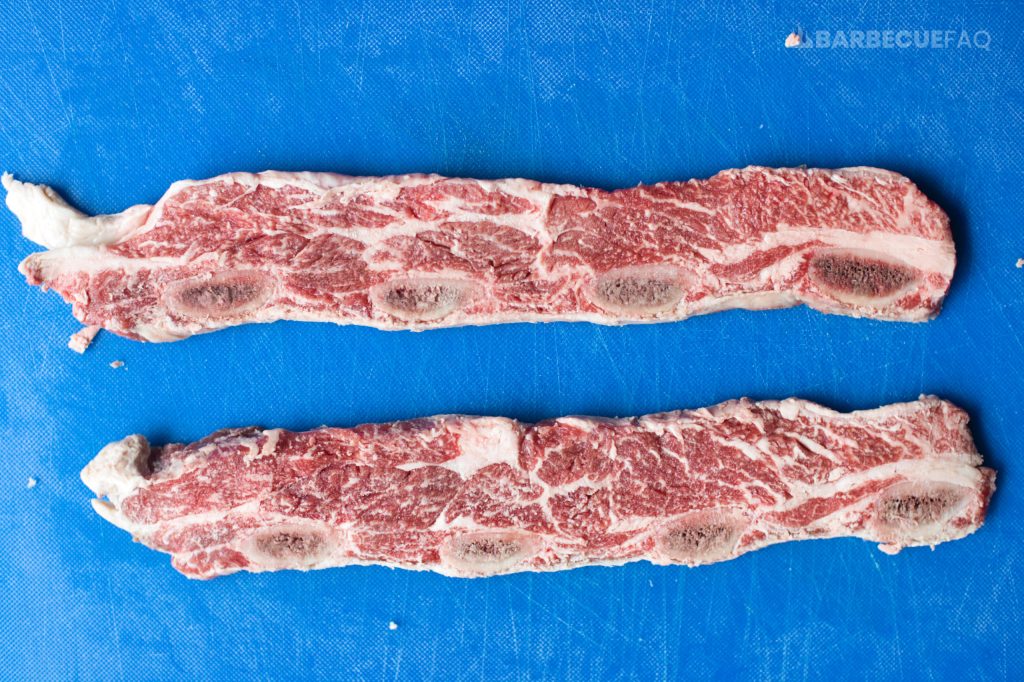
So, Why are these Ribs so Expensive at Barbecue Joints?
If Butchers can only use ribs 6, 7, and 8 to fabricate dino beef ribs, that means there are only 2 slabs on the whole cow.
So the meat is desirable but scarce.
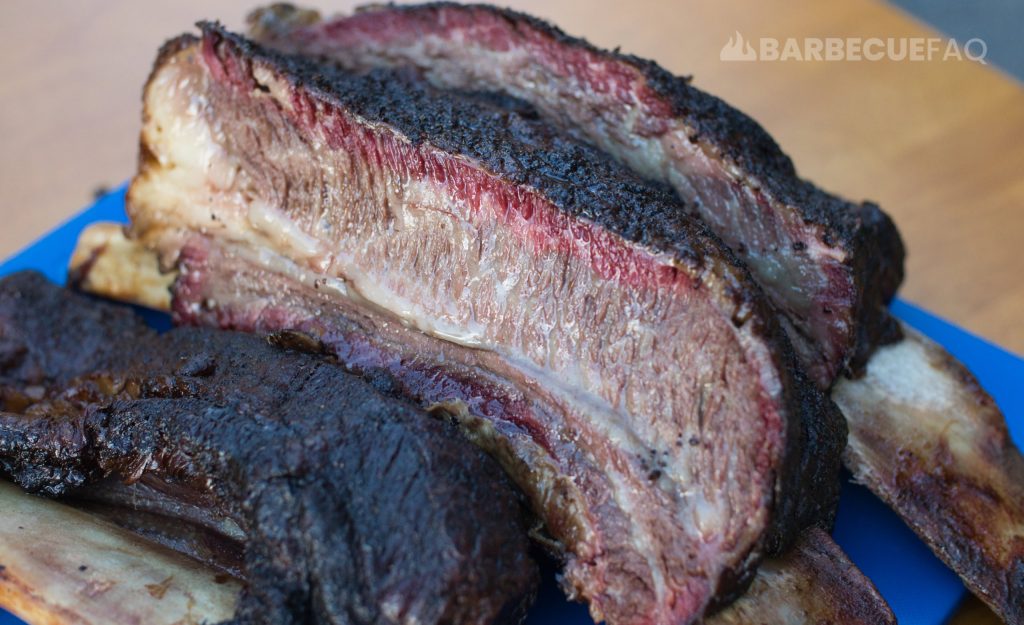
At a BBQ Restaurant you can expect the following scenario:
Most dino ribs weigh 1 – 1.5 lbs, per bone.
All orders will come with the bone and are weighed with the bone.
If the menu says $15-25 per lb for beef ribs, and you order 1 beef rib, say it weighs 1.4 lbs for the meat and the bone.
You’re then paying $21 – $35 for 1 dino beef rib (meat + bone).
This is Simple Economics:
- Assume dino beef ribs are $11.98/lb wholesale.
- Beef ribs shrink considerably after smoking due to protein shrinkage, rendering of fat/collagen, and moisture loss.
- They have to use dry rub/spices to smoke; They use charcoal/wood to smoke with and for fuel.
- They have to pay several employees to season the meat, smoke the meat, and slice the meat.
- etc.
The price per pound needs to be more than $11.98 to cover the costs and to turn a profit.
Know and understand this fact before you buy this cut of meat.
Other Names for Dino Beef Ribs?
- Short plate ribs
- 3-bone beef ribs
- “Brontosaurus” Ribs
- Brisket on a Stick
- Plate Ribs


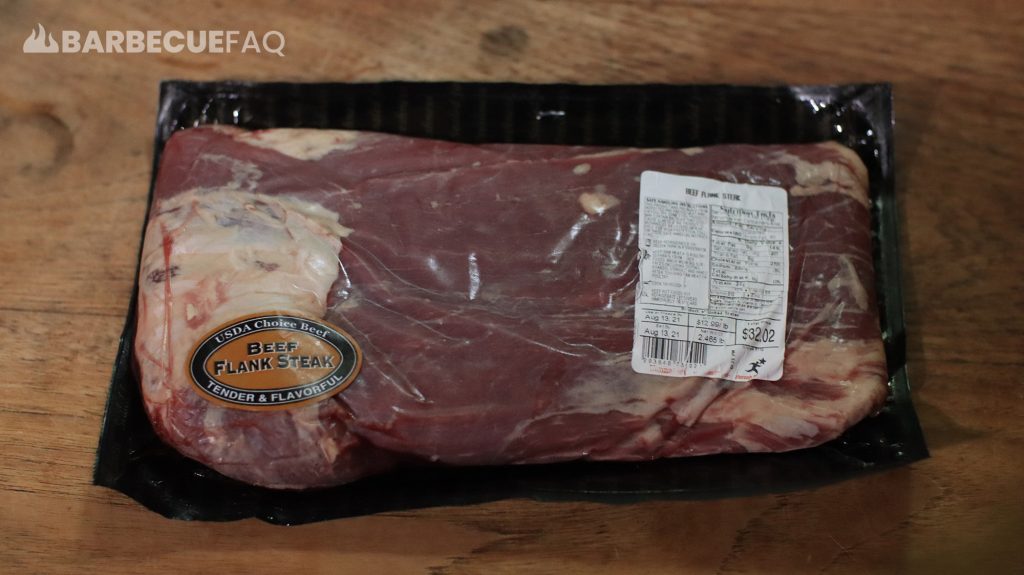

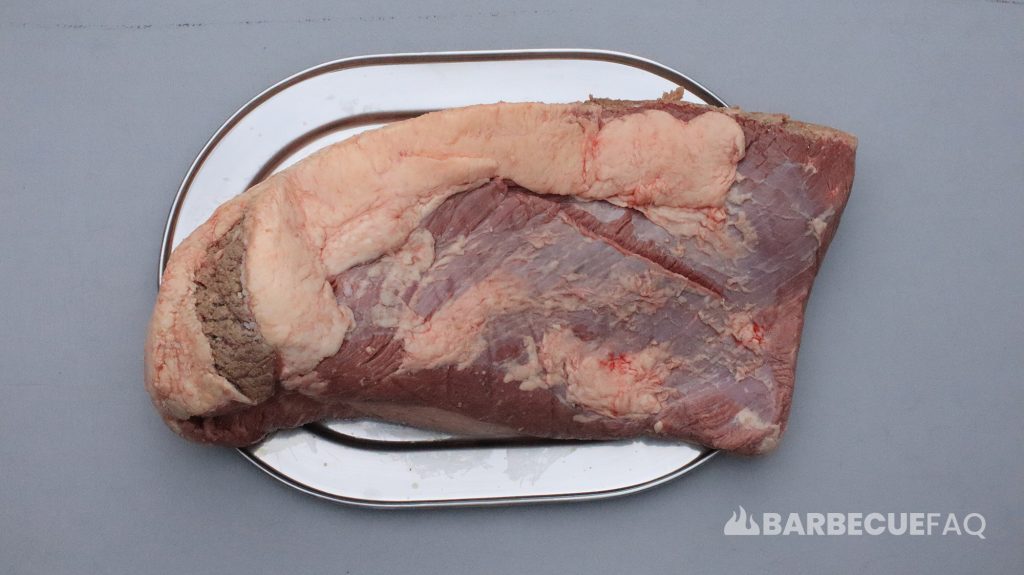
4 comments
Mark E
Bookmarked. Found this with AI. This is the most complete, most thorough, and most concise explanation of beef ribs on the internet. I know because I’ve scoured the internet many, many times over the years looking for a good source of this info and the info found prior to last fall has been frustratingly inadequate, unclear, and confusing. Well done, sir. Thank you.
I wonder if the BBQ world could come up with established names for “holding” slow cooked beef, relative to “resting” slow cooked beef? The two words are often used interchangeably which invites confusion.
Here is a discussion on reddit on holding and resting.
Seems to me, cambro or faux-cambro holding vs warmer-oven (e.g. alto-shaam) holding are two different things and therefore should have two different names, but that’s just my opinion.
Dylan Clay
Hey Mark!
I really appreciate your comment.
What’s sad is that after recent Google updates my content was deemed “unhelpful” too; Yet you found me and my article answered your question – go figure.
—
So “Holding” is distinct from “Resting” as it quite literally means to “hot hold” at a food safe temperature (above 140F) – which is especially important with regards to selling food.
Some of these BBQ joints treat it as a form of extended rest for service the next day. As you can take the briskets off when they’re near tenderness and then through carry over cooking, they’ll continue to tenderize and fix tight spots.
At home I do the same thing – I either smoke until completely tender, then rest, then hold – OR – If I notice that a spot has a slight tightness, I won’t rest and will directly hold overnight (I use my electric smoker).
The devices you’re describing like Alto-shaam and Crescor are also extremely expensive and impractical at home – where-as a Coleman cooler and some old towels or even a Cambro are far cheaper BUT can’t “hold” the food for an extended period of time; They’re just used as a mechanism to “rest” the meat slowly.
Resting is done for brisket and BBQ in general because you’re gelatinizing collagen. Once the collagen/muscle fibers have broken down, resting allows this now gelatinized collagen to set back up. If you didn’t rest you’d end up losing far more juices and your meat would oxidize and dry out faster.
I agree with your sentiment with regards to these words being used interchangeably but the key distinction is that one is designed to keep cooked food’s internal temperature above 140F. Where-as the other can, but only for a limited amount of time as there is no heat element other than the insulative properties of the cooler and the heat generated by the meat.
Side note: That reddit link brings up the concept of resting steak – which is categorically different from resting brisket. Steak gets juiciness from free-moisture content, which is why people cook to medium-rare. Resting steak results in less juice loss (to a small margin – Meathead also has an article on this), it also helps with “rouging” of the meat – or the wall-to-wall color of the meat as apposed to a huge gradient of doneness temperatures.
Hope that helps!
george a lee
Fantastic writing
Dylan Clay
Thanks for the kind words George!